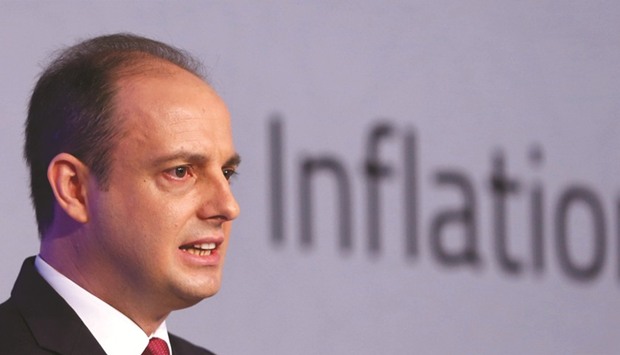Turkey’s central bank expects inflation to remain volatile for the rest of the year, and won’t rush into cutting interest rates if price increases slow, governor Murat Cetinkaya said.
The bank now expects the inflation rate to be 8.5% at the end 2017, half a percentage point higher than it forecast three months ago, Cetinkaya told reporters in Istanbul on Friday. Seasonal factors affecting food prices will drive fluctuations in the rate, the bank said in its quarterly inflation report.
The comments were meant to reassure investors that the bank’s tightening cycle, which began in January when the lira fell to a record low against the dollar, won’t be rolled back at the first sign of easing inflation. Policy makers unexpectedly raised a key interest rate on Wednesday, a move that demonstrates the bank’s determination to keep policy tight, Cetinkaya said.
“In this period, we will continue to focus on the main trend,” Cetinkaya said. “We will not show a premature reaction to downward fluctuations.”
The bank also raised its inflation forecast for the end of 2018 to 6.4% from 6%. Its latest projections show that it will only meet its goal of 5% in 2019, nine years after the bank last met its official target. Annual consumer inflation rose to 11.3% in March, the highest level since 2008, driven by food and clothing prices and the weaker lira.
“The forecast revisions were totally warranted, but still too optimistic,” said Cristian Maggio, head of emerging markets research at TD Securities, which has a year-end forecast of 9.8% for 2017 and 8% twelve months later.
Though it has pared losses since January, the lira is still trading almost a fifth lower against the dollar since last year’s failed military coup, making it the worst-performing emerging market currency in a basket of 24 tracked by Bloomberg. Its depreciation is the key reason for the revised year-end inflation forecast, along with higher use of production capacity in Turkey, the central bank said in the report.
The government has increased spending on public projects and helped banks to extend commercial loans as it tries to boost growth. The latter policy may add as much as 5 percentage points to credit growth this year, Cetinkaya said.
The stimulus measures will have no long-term impact on Turkey’s monetary policy objectives, the governor said, describing the support as “temporary.”

Turkey’s central bank governor Murat Cetinkaya speaks at a news conference in Istanbul (file). The bank now expects the inflation rate to be 8.5% at the end 2017, half a percentage point higher than it forecast three months ago, Cetinkaya told reporters in Istanbul on Friday.
